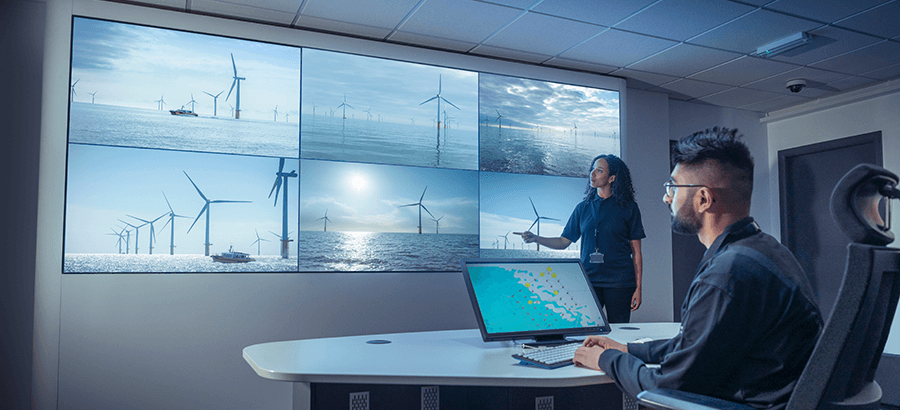According to the International Energy Agency, renewable energy will account for 47% of the world’s electricity generation by 2030 — up from 30% in 2022. These include manufacturers of wind turbines, equipment used for solar power and hydropower, and components used in geothermal plants. As technology for green power evolves, there are new players entering the market, and some companies will be involved in multiple technologies for renewable energy.
Many renewable energy organizations are missing out on the benefits of ERP software that would allow them to tackle the challenges of data management, improve process efficiency across the organization, and manage projects more effectively. An ERP solution can integrate with other systems and would enable companies to connect and manage the complex network of information and equipment. It also provides a high level of security and privacy that regulations require.
Data management
Managing and making effective use of data is a major issue for renewable energy organizations, as it is in other sectors. An ERP system allows organizations to get information to departments and decision-makers wherever they are at a faster rate. Data across the business is available in real time, keeping operations running smoothly and on time.
Extensibility
Renewable companies manage vast networks of software that are technologically diverse and geographically spread out. The task of digitally connecting all of those moving parts is critical to the success of the organization. An ERP with powerful extensibility enables the connection to equipment around the network to improve data access. Being able to access a variety of data protocols and data formats, people can measure and see what is occurring anywhere in their environment.
Minimize waste
The renewable energy industry needs to limit waste as much as possible. An ERP system enables the most effective use of critical resources by minimizing wastage through proper planning management, task execution, and workflow oversight to achieve profitability. Whether it’s time, money, or energy, an ERP implementation can help the renewables sector save more of its valuable resources.
Customer relationship management and service
Excellent customer service is a key requirement for renewable energy companies. A customer relationship management system is critical for:
- managing and cultivating relationships with all constituents via workflows and processes that consistently deliver services on time,
- identifying and targeting prospects for highly focused, personalized campaigns, promotions and communications,
- creating a holistic view of all accounts and their contacts with related activities in a single view.
Finance and accounting
An ERP system provides fully integrated information about financial data, allowing companies to configure and monitor business processes and workflows, and get immediate visibility into financial performance with role-based dashboards. By automating processes, it eliminates errors and reduces reliance on spreadsheets.
- It can track, manage and report the book value and depreciation of fixed assets.
- When dealing with customers, it streamlines the acceptance and processing of electronic payments in a secure and reliable manner.
- It ensures proper security, supports compliance and enables full audit trail visibility.
- For period-end, companies can close the books quicker and report financials accurately.
- Budgeting can be centralized with forecast and actual information in one place, providing a single version of the truth.
For financial planning, an ERP system can model and evaluate “what if” scenarios between actuals and projections and update forecasts. Companies can establish rolling forecasts and analyze the variance between actuals and projected results.
Revenue management can be improved by automatically generating and dispatching invoices at recurring intervals on time.
Expense management and procurement can be integrated with the rest of the organization so that:
- approval to acquire goods and services can be done quickly and easily;
- the procure-to-pay process can be automated;
- procurement can be optimized for recurring needs with negotiated terms, tiered pricing, and pre-specified delivery schedules;
- compliance can be enforced with purchasing thresholds and guidelines;
- there is real-time visibility into spending trends across the organization.
Reporting and analytics
An ERP system integrates information across the entire business which means that operational and financial data is consolidated in one place.
- With reports and dashboards, real-time information is available on company performance across all business functions — from summary to transaction level.
- The system ensures compliance and security of reporting, including segregation of duties.
- The organization can work from a single version of the truth with all data residing in a single source.
Inventory management and supply chain
Managing inventory efficiently is key to reducing costs and improving profitability. An ERP system provides real-time, detailed visibility into key inventory control and supply chain management measures.
Procurement processes can be streamlined to minimize the risk of overstocking in the warehouse when orders for items and parts are placed. It allows analysis of how expected sales and purchase orders will affect inventory levels. With demand management, procurement can ensure the maintenance of sufficient inventory levels.
Using a self-service portal for partners and vendors, collaboration can be improved throughout the entire supply chain.
Project management
Renewable energy projects involve various phases — design, planning, tendering, health and safety, and completion. Project management is important for:
- resource allocation,
- managing costs and time,
- risk management,
- stakeholder engagement,
- aligning project goals with sustainability goals
Benefits of ERP for renewable energy companies
An ERP system breaks down information silos, unifies data under one source and eliminates the burden of maintaining multiple systems.
Renewable energy businesses can use an ERP to modernize their systems to increase agility, accelerate growth, and respond more quickly to market changes and evolving customer needs.
The SYSPRO ERP software has supported many types of manufacturers for some time — from production of components and parts for the automotive and electrical sector, to manufacturing of large and complex machinery used in heavy industries. Many manufacturers have grown their business with SYSPRO, proving that it can scale as companies grow. In addition, the software is available on-premise and in the cloud, giving manufacturers a choice in how they deploy their ERP system.








2 thoughts on “How ERP can make renewable energy companies more efficient”
An insightful exploration of how ERP systems can significantly enhance efficiency within renewable energy companies.
Regards
https://eresourceondemand.com/
Thankyou This Blog was Really Helpful.